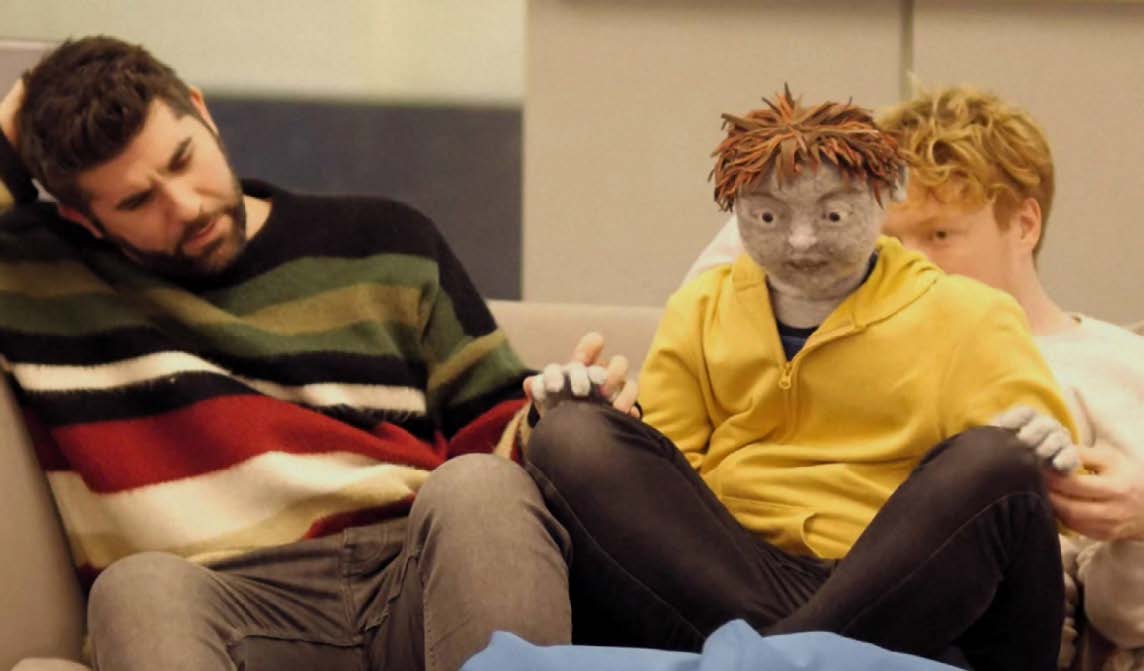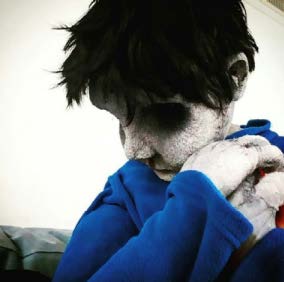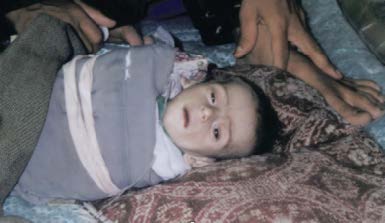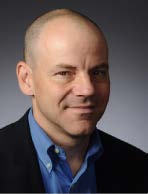Autism politics are at it again. Will the latest episode lose steam, or is the fight over a British stage puppet a sign of things to come?
BY MICHAEL JOHN CARLEY
AUTHOR'S NOTE: The following is an updated version of a column written for the Huffington Post in 2015.
Over the last few years, all's been relatively quiet on the front of autism politics. But a recent controversy in Great Britain shows signs that we're perhaps ready for another round. The source of the drama (no pun intended) is a play.
A ll in a Row, written by Alex Oates, was produced earlier this year at London's Southwark Playhouse. The play concerns a married couple about to send their autistic, 11-year-old boy off to a residential center because they either cannot cope, or feel they cannot cope with Laurence. The child displays behaviors of one who has significant challenges such as biting and hitting. I can't speak to the writing of the play but the source of the real uproar was more about the character of the child having been portrayed – not by an actor, or a spectrum actor, but – by a puppet. People on my side of the autism spectrum were livid. 1,2,3,4
To be fair, there's the controversy over using a puppet, and there's the controversy over "what does the puppet look like?" as well as how the character/puppet is referred to. As to the first controversy, puppets have been used in theatre for centuries, most notably as foils (a la Punch and Judy) and in traditional forms of Asian theatre. Their modern usage parallels the manner in which we've tackled deeper philosophical issues through the medium of science fiction. The first Star Trek series on television, or books by Ray Bradbury are great examples wherein we often feel more comfortable exploring tougher themes through distance. Movies such as Get Out now examine big topics through the genre of horror. What we used to call "kitchen sink realism" doesn't sometimes cut it as a vehicle to discuss painful stuff. So, with the (albeit real) disappointment that another casting opportunity for a spectrum actor has been lost, I give this controversy a dispassionate "pass."
However, the production's response to "#puppetgate"? Not so good. Does (lead actress, Charlie Brooks) think the creative team had any choice but to represent Laurence the way they have? "No," she says firmly. "Unless you were to cast an adult, but Laurence would have to be an adult, and that would be a different play." – All in a Row actress Charlie Brooks on autism row: "We were told to expect a reaction, but we never expected such a backlash."
– Clare Allfree, The Evening Standard (UK), February 19, 2019. Ms. Brooks is wrong. Child actors have been cast in material that is dark, or adult-themed, for quite some time. While I don't want casting to return to the days of an 11-year-old Brooke Shields portraying a sex worker's daughter in 1978's Pretty Baby, or a 13-yearold Jodie Foster portraying a real sex worker in 1976's Taxi Driver…given the right care it is by no means unheard of when child actors are healthfully eased into the adult content they may be exposed to.
But regarding the second controversy, it's a no-brainer: what the puppet looks like isn't pretty.

GRAY AREA: The play ignores everything we've learned surrounding not only the humanity of potentially-ostracizing behaviors, but also what constitutes healthy parenting strategies; Unhealthy attitudes appear to have been portrayed as inevitable, and therefore justifiable.
Note the skin color, and empty eyes and you conclude that the Halloween, Chucky and Friday the 13th comparisons are justified. As the easily-googled comments testify, this production embraced the 1990s tragic model of autism and truly ignored everything we've since learned surrounding not only the humanity of potentially-ostracizing behaviors, but also what constitutes healthy parenting strategies vs. unhealthy parenting strategies. In this context, unhealthy attitudes appear to have been portrayed as inevitable, and therefore justifiable.
Parents who object to my way of thinking, however, rose to defend the play (like me, without having seen it), striking in them what feels like an irrefutable chord. By giving in to the natural despair that some parents are culturally conditioned to embracing, the play has won a support base, though I have doubts about how strong.
Let's just say for argument that Oates' play is a poorly-researched and ill-conceived endeavor. He supposedly worked with challenged folk for 10 years in what we (in the theatre) used to call "a stupid day job," but it doesn't look like he was listening to more than overwhelmed parents. Is this disaster all his fault? God no. There are the producers, the director (Dominic Shaw), and even though the largest autism organization in Great Britain, the National Autistic Society (NAS), withdrew its support of the play (their statement is not on their website but was relayed through four tweets5) NAS was originally signed on as consultants, and don't seem to have made the turnaround until the play's unpopularity was painfully evident.
If you were at all in doubt, the picture of the puppet you see above was, believe it or not, an improvement on the original version, shown below. So you can see the intent, or where this play is going pretty clearly.

TONE ADJUSTMENT: The play's producers decided that the initial design for the Laurence puppet was too stylistically dark to sensitively portray the character, and a more childlike, yet still abstract, design should be explored.
The production had a surprising defender, the Simons Foundation's usually reliable autism news service, Spectrum. Writer Alisa Opar, who's written admirable features in the past – that I've forwarded through my newsletter – such as "How to Help Low-Income Children with Autism" and "The Healthcare System is Failing Autistic Adults," penned a long, rather inexplicable piece called, "In Search of Truce in the Autism Wars".
Opar's piece spoke of a favorable review of Oates' play in the Guardian, yet failed to not only mention the clear majority of critical reviews, but she overlooked a piece of commentary in the very same publication (the Guardian) entitled, Casting a puppet as an autistic child is a grotesque step backward. Were Opar a less skillful writer, her piece wouldn't carry its deceptive and misinformative danger.
The propagandist nature of Opar's article may not be coincidental. It falls at a time in which we're again starting to see the parents of significantly-challenged kids trying to paint autism in a tragiconly light, and Opar may have a personal connection that I'm not aware of. This loud minority (by no means the majority of parents with significantly-challenged children) want ownership back over the messaging of autism, control that they enjoyed before the turn of the century, when they could paint themselves as "warriors" and hero parents. It is a period best exemplified by the horrific 2009 Autism Speaks video "I Am Autism."6
New organizations like the "National Council on Severe Autism" (NCSA) are now emerging to combat what makes autism unique— it's vast spectrum – if not diagnostic standards set up in DSM-5 (which, oddly enough, are definitions written by clinicians whom this crowd often heralds, such as Catherine Lord). On NCSA's website7 they plainly attempt to resuscitate the farcical notion that one can "love the child but hate the autism.8" My very first "Autism Without Fear" column, the first of 30-plus that I wrote for the Huffington Post, was called, "In the Autism World, Maybe You Just ARE a Bad Parent."9 Do I need to do an update of that piece too?
My "Calling a Truce in the Spectrum Wars" (2006),10 as opposed to Ms. Opar's similarly-titled piece, attempted to invent a term, "the competition of suffering," to describe the warring between extreme ends of the spectrum. In trying to convey the uselessness inherent in a) articulate, verbal spectrumites invalidating the seriousness endured by the families of signif icantly-challenged individuals, or b) vice versa; I gave this fruitless endeavor a name/phrase that I thought was so perfect that the world would be shamed into overnight change.
"Ha-Ha!," "Yeah, right," and "How'd that work out?": I see the same comments today that I saw 15 years ago – response sections of the myriad of articles I read wherein both the authors and their subjects become the targets of rageful someone's on "the other end," only because the likely overwhelmed commenters' spectrum experience differs. Mostly, I blame the so-called autism leaders for encouraging that anger, and not the commenters.
One could argue that the messy-headed battle for autism authority is par for the course in our world. Thanks to DSM-5, few diagnoses encompass such a range of abilities and challenges as the newly-defined "autism," and as human beings we love (and sometimes need) to compartmentalize. Within what constitutes autism, Albert Einstein and a non-verbal individual have differing shades of the same condition. We are presented with a diagnosis whose definition often presents extreme variations demanding polar opposite needs.
Well, the masses have been somewhat accepting since the DSM-5 came out in 2013, but this particular crowd is is once again demonstrating no willingness or intelligence to stomach such a disparity of abilities and/or challenges. Once again people are trying to dumb down the condition that – according to the c – can't be dumbed down. Additionally, the inability to emotionally regulate is often a diagnostic tell (throughout the gene pool – that's you, parents) that can be part of an autism diagnosis. Thus, the potential in our universe for irrational super-sensitivity… is enormous.
Lastly, spectrum individuals and families endure more financial hardships than most, and poverty can be clinically-linked to intelligence-robbing anxieties, anger and depression, obstacles that people with no experience of poverty have difficulty comprehending. Unlike the worlds of cystic fibrosis, or Down dyndrome, the autism world also does not have one, primarily-unifying non-profit that everyone rallies around, goes on fundraising walks for, or volunteers for in the consensus-filled spirit of shared goals. In the autism world, we have a gajillion such organizations, almost never representing the entirety of the spectrum, and founded partly in the rejection of existing orgs. In our world we have three million people imagining themselves as leaders… but no followers. And with all those non-profits, no centralized guiding entity exists, or can exist. Sadly unable to coalition, they then compete for limited funds and press attention...by screaming. Whether it's spectrum folk like myself going after one another to jockey for attention by stating that Autism Speaks is complicit in murders,11 in destroying chat group relationships over semantic issues; OR whether it's the pro-cure folks declaring that all three million of us can't use the toilet (uh, last I checked...?),12 the b.s. statistic of an 80% divorce rate,13,14 the aforementioned "I Am Autism" video, or the antivaxxers' insinuation that people like myself are simply poisoned, chemical accidents… we get comedy worthy of Vonnegut.
The past leadership of major players in the world of autism politics – rather than trying to soothe or steer the emotions of its overwhelmed members towards healthier perspectives – often willingly, in that battle for recognition, poured figurative gasoline on the fires consuming their constituents. Instead of healing, big-picture perspective, they doused those who trusted (and needed them) with alarmist, often misinformative rhetoric.
Both Ms. Opar, and especially Mr. Oates, would have been spared so much criticism had they only lifted a finger to do their homework. And their inability to resist the unhealthy need for someone to blame (autism itself) is perhaps a sign that more troubling aspects than laziness exist. The only entity anyone should ever blame is the fact that these overwhelmed families – of significantly-challenged kids or the kids that present as I once did – are not receiving the services they need and deserve. Giving voice to overwhelmed people's opinions when they are the very product of being overwhelmed, and not wisdom, kind of goes beyond irresponsible. For instead of fighting for the services they need, these parents are then revved up, and encouraged to pick a fight with fellow, marginalized people with legitimate disabilities. In the autism world, we fight. We fight over words, vaccines, aversives, behavioral strategies, and what research is ethical or that which is not. Most of the consequences for winners and losers of these fights surround our attitudes towards what constitutes a happy life, and this is rather big stuff; while other battles – vaccines and aversives – can determine whether people live or die. There is cause for anger, especially when services are the opposite of satisfactory, yet the majority of funding goes towards genetic studies having no impact on families living today.15
But what's the best strategy to right this ship? Is the answer not to fight? I'd vehemently answer "no." I believe in confrontation 100%, and even privately believe that those who are afraid of confrontation actually do engage in a very negative and subtle way. How we confront, however, is where our value can be measured.
A long, long time ago – before my diagnosis, or my son's diagnosis, I had a different career. I've written about it before, and I'll write about it again. As a Non-Government Organization Representative ("NGO Rep," a very, very, low-level diplomat) through the United Nations, I got to travel to some outof-the-way places. I did some work in Cuba, some in Bosnia, but I spent more time than anywhere in the Middle East, as the Project Director for an endeavor that repaired water treatment facilities in Iraq back during the Saddam days.
Because of the economic sanctions that existed before our invasion, the chemicals and coagulants required to purify water could not be imported; and, according to a 1998 UNICEF report,16 over 5,000 Iraqi children were dying every month as a direct result of sanctions – mostly due to waterborne illnesses. Eventually, by late 2001, The Iraq Water Project17 would provide clean water to 81,000 people through four restored water plants in the hardest-hit Basra region.
It was early 2000, and not only was it in question that we would be able to secure an agreement with Saddam Hussein's angry government, there was also no certainty that in the process we would keep our emotions together. Though no fans whatsoever of U.S. policy towards Iraq, we also (no surprise) despised Hussein's regime. And while we'd encountered a lot of human suffering in our work, most of us knew that we hadn't seen it on the level we were about to witness.
During our travels there, we went to special children's wards at sanctions-desecrated Iraqi hospitals... to allow the tiny victims to confront us. One of the requisites of appeasing our tempestuous government hosts was to acknowledge their suffering through a myriad of visits.
The first time we apprehensively entered one of those, roughly, 30 by 40foot rooms, we saw it filled with all those fading children. They lay dispersed in a health care facility that rarely enjoyed electricity or hygiene. A bright desert sun lit the room through a window while overwhelmed staff tried in vain to wash floors without cleaning materials, working around the bedside mothers and the metal-frames of their children's last resting place. It was no secret to staff, the mothers, or anyone, that no child would survive their stay. Were a bed to empty, it would be filled immediately by the same human dilemma.
But I was to discover a surprising solace as I spent time with each child. In focusing on the individual, the political angers disappeared. The big-picture frustrations were forgotten within the revelatory context that in that moment, they were not within my control. To my relief, right in front of me, was something that I could control, even if it was just a self-serving moment of reassurance. Fellow delegates followed suit. We did not renounce the politics; we in fact reinforced our belief systems by temporarily shelving them; by shutting them out so we could stop remembering that which we already knew, clear the brain, and therein learn more.
We were not traumatized by trying to "ride the wave" of these tiny individuals – our tears discouraged trauma. Trauma herein comes when you close yourself off and work to avoid that wave. Those kids did not share the grownups' offended sense of justice (that was our baggage) and most were past the point of fear. They just wanted to be held, made as comfortable as possible, and be told that everything would be all right, until it was all over. To overemote with them would have caused them confusion and anxiety during a time in which they sought peace.
When our delegation departed the ward, my overwhelmed dele gates tearfully vented about the indisputable global injustices that had influenced our day. They were not articulate, nor did they make good points as they raged against the heavens. Yet the human need to speak in this clumsy manner epitomized necessity itself. You just didn't want to quote them in that particular moment.
But when they next approached a microphone, weeks later, back in the states after having time to process, they spoke differently, sensing the responsibility they had in this very different kind of moment. People needed them to clarify and enlighten, and they rose to the opportunity to inform their audience. To spew would have had a counter-effect. So instead, they led, and they led through eloquence.
Imagine my shift then, as I switched careers into a culture where having a child who couldn't talk was often treated as the worst injustice possible, where having measles was preferable to having autism, and where one prominent leader in the spectrum world confessed to me, "This is war." In the autism world, we do the opposite: we turn the microphone on when we're overwhelmed. And when we are overwhelmed, we simply spout stupid, often-inaccurate, and counter-productive rhetoric.
Would more diplomacy work? Maybe not. Diplomacy worked for me for a very long time with GRASP, and the hate mail I got from both extremist ends of all the debates had me in what I thought was an ideal position. But then the day came when diplomacy wasn't working anymore; when our press (and subsequent funding) started shifting away to those organizations who engaged in the rhetoric. It took me two years (too many) to figure out that the extremists, and not I, had accurately calculated what the autism world now wanted from us. The press and funders merely obliged.
As someone who doesn't have to be so diplomatic anymore (and I admit, it's liberating)... Militant spectrumites? Work on your capacity for, if not come to terms with our challenges towards emotional regulation – letting the small stuff roll more and more off our backs. This cowardly inability to face the mirror causes us to fight each other, as well as occasionally show us to be unreliable, emotional train wrecks. As a collective we'll be infinitely more powerful for it. For when compared to our potential numbers, the membership tallies in our organizations are quite low, and in most cases have recently shrunk. GRASP, my old org, is all but deceased. ASAN is currently in better shape than GRASP, but carries nowhere near the impact it once had. And to those families who get so bent out of shape when someone accomplished comes out as on the spectrum, and is thus writ ten about? You are attacking people with legitimate disabilities, even if the challenges they faced are not familiar to you. If you feel so assaulted with stories of potential, understand that it is to show others what we can do (trust me: Your dedication to what we can't do, was heard). I won't ask you to look in a mirror and ask if someone with a disability might be ten times the father, mother, or human being you'll ever be. But maybe I should? Maybe it's time to challenge your worth? If you'd look at what factored into those successful people's development you might help your child.
The new leaders need to lead with eloquence, not rhetoric. Because to confess: I cringe (if not darkly die laughing) when I hear any of us use the word "community."
Ms. Opar's article ended without mentioning the petitions asking the Southwark playhouse to pull the plug on the play during its run (one at 19,000 people18 and one at 24,000 people19). Oates continued to defend himself.20 Through her inclusion of quotes by ASAN's Julia Bascom, Opar acknowledged our side's desire to help the families of significantly-challenged spectrumfolk through increased services. But she closed the piece with a quote from Oates, wherein he asked: "If there was a way for those autistic voices to turn their outrage into advice for the parents, I'd love that." If he'd only listen, and stop paying lip service to legitimatelyoverwhelmed people, he'd see that the answer to his and Opar's questions is right there – it really is about the services. Those families aren't getting them. Keep blaming a genetic condition if you want, but again, the funny thing about genetics is that you can't win unless you die. Or maybe Oates is smarter than I'm giving him credit. And that he simply knew how to draw a crowd.•

OVERWHELMING: My overwhelmed NGO delegates tearfully vented about the indisputable global injustices that had influenced our visit to the childrens' ward. They were not articulate as they raged against the heavens. You just didn't want to quote them in that particular moment.
ABOUT THE AUTHOR:
Michael John Carley is the founder of GRASP, a school consultant, and the author of Asperger's From the Inside-Out (Penguin/Perigee 2008), Unemployed on the Autism Spectrum (Jessica Kingsley Publishers 2016), the upcoming Book of Happy, Positive, and Confident Sex for Adults on the Autism Spectrum… and Beyond!, and the column, "Autism Without Fear." In 2000, he and his son were diagnosed with Asperger Syndrome. When re-evaluated in 2014 under DSM-5, he was diagnosed with autism spectrum disorder. For more information on Carley or to subscribe to his updates, go to michaeljohncarley.com

References
- 1. medium.com/@chuckwinters/an-open-letter-to-alex-oates-and-the-company-of-all-in-a-row- 6960dfb8b582
- 2. themighty.com/2019/02/uk-play-all-in-a-row-puppet-gate-autism-outrage
- 3. youtube.com/watch?v=16zOr4Iq9ks
- 4. theaspergian.com/2019/04/26/script-for-puppetgate
- 5. twitter.com/autism/status/1093537536163676160?lang=en
- 6. youtube.com/watch?v=9UgLnWJFGHQ
- 7. ncsautism.org
- 8. ncsautism.org/blog/autismimmensesuffering
- 9. huffpost.com/entry/autism-without-fear_n_4895655
- 10. michaeljohncarley.com/images/CallingTruce.pdf
- 11. autisticadvocacy.org/2007/12/comments-at-november-30-2007-iacc-meeting
- 12. justthevax.blogspot.com/2013/11/no-more-letter-to-suzanne-wright.html
- 13. webmd.com/brain/autism/news/20100519/autism-famlies-high-divorce-rate-is-a-myth#1
- 14. washingtonlife.com/issues/october-2006/bob-wright
- 15. huffpost.com/entry/autism-without-fear-we-ra_n_6199216
- 16. unicef.org/newsline/99pr29.htm
- 17. iraqwaterproject.org
- 18. southwarknews.co.uk/news/petition-autism-all-in-a-row-southwark-playhouse-puppet
- 19. thepetitionsite.com/454/050/610/demand-southwark-playhouse-pull-play-that-dehuman- ises-autistic-children/
- 20. chroniclelive.co.uk/news/north-east-news/all-in-row-alex-oates-15823286